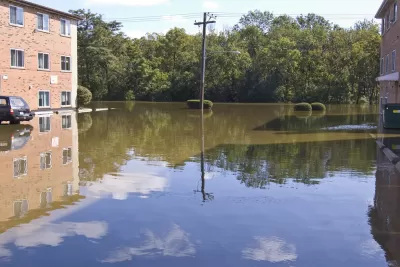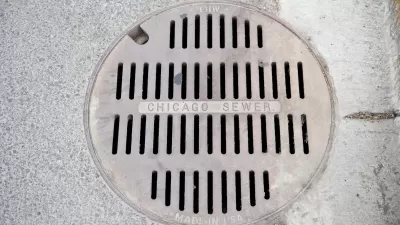Chicago residents living in low-lying parts of the city dread the rainfall that too often brings flooding.

Michael Hawthorne and Morgan Greene report on flooding in Chicago that leaves residents with basements full of water, sewage, and, in some cases, sewer flies. The city’s aging sewer infrastructure cannot handle any sort of rainwater deluge, and the results of the urban flooding have been substantial, write Hawthorne and Greene:
Flood losses in the city and suburbs cost taxpayers $1.8 billion in subsidized grants, loans and insurance payments between 2004 and 2014, according to a report released last month by the National Academy of Sciences. Only hurricane-ravaged areas of coastal Louisiana, New York and Texas received more federal flood aid during the decade.
A number of Chicago neighborhoods are in low-lying areas that make them vulnerable to flooding. "To make matters worse, sewers in Chicago and older suburbs were designed to handle runoff as well as waste from homes and factories. When it rains, the combined sewers quickly fill up, forcing a noxious brew to flow back into basements and out of dozens of overflow pipes into local streams," say Hawthorne and Greene.
Community advocates say the city has been slow to respond, even as it has continued work on the Deep Tunnel, an underground tunnel system designed to handle the runoff that will not be completed until 2029. Some neighborhoods are being proactive and working with organizations like the Center for Neighborhood Technology on strategies to help better manage stormwater drainage.

Alabama: Trump Terminates Settlements for Black Communities Harmed By Raw Sewage
Trump deemed the landmark civil rights agreement “illegal DEI and environmental justice policy.”

Study: Maui’s Plan to Convert Vacation Rentals to Long-Term Housing Could Cause Nearly $1 Billion Economic Loss
The plan would reduce visitor accommodation by 25% resulting in 1,900 jobs lost.

Planetizen Federal Action Tracker
A weekly monitor of how Trump’s orders and actions are impacting planners and planning in America.

Wind Energy on the Rise Despite Federal Policy Reversal
The Trump administration is revoking federal support for renewable energy, but demand for new projects continues unabated.

Passengers Flock to Caltrain After Electrification
The new electric trains are running faster and more reliably, leading to strong ridership growth on the Bay Area rail system.

Texas Churches Rally Behind ‘Yes in God’s Back Yard’ Legislation
Religious leaders want the state to reduce zoning regulations to streamline leasing church-owned land to housing developers.
Urban Design for Planners 1: Software Tools
This six-course series explores essential urban design concepts using open source software and equips planners with the tools they need to participate fully in the urban design process.
Planning for Universal Design
Learn the tools for implementing Universal Design in planning regulations.
Caltrans
Smith Gee Studio
Institute for Housing and Urban Development Studies (IHS)
City of Grandview
Harvard GSD Executive Education
Toledo-Lucas County Plan Commissions
Salt Lake City
NYU Wagner Graduate School of Public Service





























